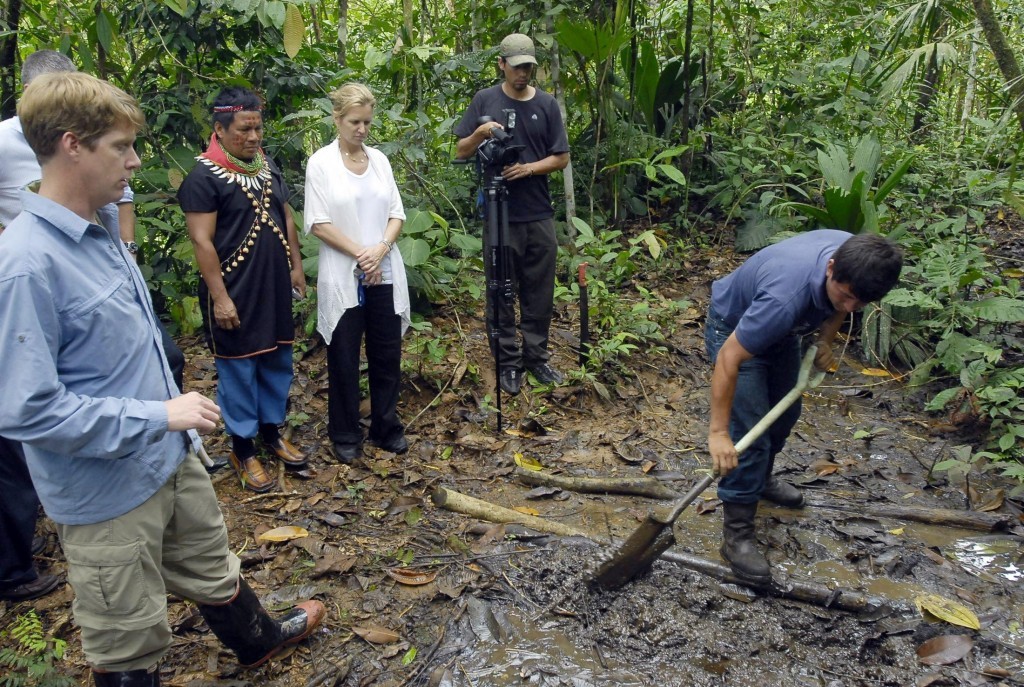
The marathon legal war over oil pollution in the jungle in Ecuador—now 22 years old—can outrage, but also exhaust, diligent observers. But here’s a new twist.
Lately certain self-styled environmental advocates have claimed that a key witness in the case “recanted” his testimony on behalf of Chevron. That could hinder Chevron’s efforts to fend off enforcement of a multibillion-dollar judgment against it from 2011.
The thing is, he never recanted.
How did we get to this point? Texaco, later acquired by Chevron, despoiled the rain forest in Ecuador in the 1970s and 1980s. In 1993, American lawyers sued the company on behalf of indigent tribe members and farmers. U.S. courts dismissed the suit, saying it belonged, if anywhere, in Ecuador. The American lawyers restarted the litigation in Ecuador in 2003. By this time, the pollution evidence had become ambiguous, as Ecuador’s national oil company, Petroecuador, had layered on its own contamination for a decade.
In 2011, an Ecuadorean trial court held Chevron liable for $19 billion in damages, a judgment upheld by higher Ecuadorean courts, although the amount was halved. Chevron refused to pay, arguing that any remaining pollution was Ecuador’s responsibility. Then it counterattacked the plaintiffs’ legal team, led by New York lawyer Steven Donziger.
The oil company accused Donziger in a civil racketeering lawsuit in New York of turning the contamination case into a shakedown. Last year, a federal judge in Manhattan ruled for Chevron, concluding that Donziger had relied on fabricated evidence, coercion, and bribery to win the 2011 judgment. Donziger has appealed that ruling.
So far, not one dime has changed hands. The litigation hasn’t cleaned up any oil.
And Donziger isn’t done yet.
Unable to enforce his judgment in Ecuador, because Chevron has no assets there, Donziger is seeking to seize company property in Canada, Argentina, and Brazil. Chevron is defending against enforcement efforts by citing the U.S. racketeering verdict. Meanwhile, it is pursuing an international arbitration case against the Republic of Ecuador, contending that the country, in effect, colluded with Donziger.
Yes, it’s complicated. And here’s the latest shocker.
One of Chevron’s main witnesses is a disgraced former Ecuadorean judge named Alberto Guerra. He’s the guy who supposedly recanted. Guerra is a classic tainted witness. I have compared him to Salvatore “Sammy the Bull” Gravano, a murderous member of the Gambino crime family who capped a colorful career by turning state’s evidence and helping bring down John Gotti, “the Dapper Don.”
Guerra testified during the U.S. racketeering trial that he’d taken bribes from the plaintiffs to tilt the Ecuadorean proceedings against Chevron. The federal judge in New York called Guerra a suspect witness but credited his testimony because it was consistent with other evidence that Donziger’s legal team corrupted the trial against Chevron.
Now, Donziger and his allies with a group called Amazon Watch are trumpeting the allegation that in the recent Chevron v. Republic of Ecuador arbitration Guerra recanted his accusations against the American lawyer and his comrades. Their central illustration is an answer Guerra gave during cross- examination in April (transcripts were released this week). When asked about his claim that the plaintiffs’ legal team offered him $300,000 to rule in its favor, Guerra said during the arbitration: “I lied there. I recognize it. I wasn’t truthful.”
“The disclosure of the latest corrupt and falsified witness testimony from Guerra demonstrates once and for all that Chevron’s so-called racketeering case has completely fallen apart and that CEO John Watson needs to be held personally accountable for the legal violations involved,” Donziger said in a statement disseminated by Amazon Watch. “Guerra has so thoroughly perjured himself he should be behind bars, and so should Chevron management,” added Paul Paz y Mino of Amazon Watch.
In fact, Guerra did not recant the core testimony he gave in the racketeering trial. He’s a shady character who has admitted taking money from Chevron in exchange for his cooperation (the company acknowledges that, too). But he has also testified consistently that years ago he took cash in unmarked envelopes from the plaintiffs’ team as part of a scheme to fix the case against Chevron.
And the $300,000? Puffery. When first discussing his cooperation with the company in 2012, Guerra boasted that Donziger’s team had promised him that sum. “It was an exaggeration on my part to secure a better position for myself,” Guerra said on the witness stand in New York, just as he reiterated in the arbitration in April.
If Guerra were the only witness testifying to corrupt activity by the plaintiffs, his account might not be worth much. But his recollections—including his account of trying to get the two sides in the controversy to bid against each other for his services—are consistent with testimony from other witnesses in a case polluted by fraud and phony scientific evidence. That’s why the judge in New York concluded that Guerra’s testimony had value, if limited value, in backing up other evidence of wrongdoing.
And that’s why it’s important not to accept the current claims that Guerra “recanted” during the arbitration proceedings. He didn’t.